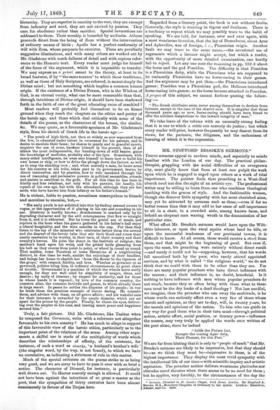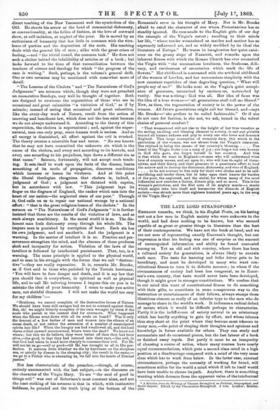MR. STOPFORD BROOKE'S SERMONS.* THESE sermons appeal to modern minds,
and especially to minds familiar with the London of our day. The practical philan- thropist, grappling with the social 'difficulties of an overgrown city, must gladly know that from at least one pulpit the work upon which he is engaged is urged upon others as a work of vital importance. The painter finds that preaching in a West-End church need not dim the sight of an artistic eye. The professional writer may be willing to learn from one who combines theological teaching with the graces of style. And the fashionable woman, though she discover little sympathy with her most cherished aims, may yet be attracted by sermons such as these,—even if for no better reason than that it may add to her sense of self-importance to sit in a chair, in a crowded aisle, among known fame, and behold an eloquent man waxing wrath in the denunciation of her particular sins.
What effect Mr. Brooke's sermons would have upon the Wilt- shire labourer, or upon the rural squire whose land he tills, or upon the successful tradesman of our provincial towns, it is difficult to know. At all events, these would receive a shock from them, and that might be the beginning of good. But even if, upon the mass, his preaching were entirely without direct result —and surely it could not be—supposing, however, that his words fell unnoticed both by the poor, who rarely attend appointed services, and by what is called "the religious world," we do not think that we could wish them to be other than they are. For there are many popular preachers who have direct influence with the masses ; and their influence is, no doubt, beneficial. Is it nothing to have influence with men whom popular preachers do not reach, because they so often bring with them what to these men must be the dry husks of a dead theology ? Not leas needful, we imagine, than the preacher who can sway the multitude, is he whose words can seriously affect even a very few of those whose morals and opinions, as they are to-day, will, in twenty years, be the morals and opinions of the nation. To him who can guide in any way for good those who in their turn must—through political action, artistic effort, social position, or literary power—influence the masses, may very truly be applied the words once written of the poet alone, since he indeed
"holds the Fixture fast,
Accepts the coming Ages' duty,
Their Present, for this Past."
We are far from hinting that it is only to "people of mark" that Mr. Brooke's sermons are likely to be impressive, but that they should be—as we think they must be—impressive to these, is of the highest importance. They display the most vivid sympathy with the intellectual life of our time—with scientific inquiry and artistic aspiration. The preacher neither delivers wearisome platitudes nor obtrudes novel theories when there seems to be no need for them ; but he applies, very forcibly, to the circumstances of the day the
• Sermons, Preached in Si. James's Chapel, York Street, London. By Stopford A. Brooke, MA., Honorary Chaplain in Ordinary to the Queen. London : Hamilton, Adams, and Co. 1869.
direct teaching of the New Testament and the symbolism of the Old. He shoots his arrow at the head of commercial dishonesty, at conventionality, at the follies of fashion, at the love of outward show, at self-isolation, at neglect of the poor. He is moved by an enthusiasm of humanity that has little in common with the viru- lence of parties and the dogmatism of the sects. His teaching deals with the general life of men ; alike with the great crises of feeling,—and "the trivial round, the common task." He does not seek a shelter behind the infallibility of articles or of a book ; but looks forward to the time of that reconciliation between the teachers of science and theology for which "the progress of the race is waiting." Such, perhaps, is the volume's general drift. One or two sermons may be mentioned with somewhat more of detail.
"The Lessons of the Cholera" and "The Naturalness of God's Judgments" are sermons which, though they were not preached on consecutive Sundays, may well be thought of together. Both are designed to overcome the superstition of those who see in occasional and great calamities "a visitation of God," as if by miracle; instead of seeing that occasional and great calamities, like the every-day work of Nature, result from the action of unerring and beneficent law, which does not the less exist because we do not always understand it. According to the theory of this superstition, the cholera is supernatural ; and, against the super- natural, men can only pray, since human work is useless. And so all energy is diminished, all effort against the evil is crushed. The theory creates a miserable fear and terror. "No one knows that he may not have committed the unknown sin which is the cause of the cholera, and every sect according to its hatreds, and ever 3 one according to his prejudices, lays down a different sin as that cause." Science, fortunately, will not accept such teach- ing. It sets itself to work upon the facts of the disease, learns something of its mode of propagation, discovers conditions which increase or lessen its virulence. And at this point the liberal theologian recognizes that cholera is, indeed, a judgment of God ; a judgment not dictated with caprice, but in accordance with law. "This judgment lays its finger on the disgrace of England, the canker which eats into the heart of our nation—the neglected state of our poor." Through it, God cane on us to repair our national wrongs by a national 'effort: "that is the great religious lesson of the cholera." In the sermon on "The Naturalness of God's Judgments" it is further insisted that these are the remits of the violation of laws, and as such always unarbitrary. In the moral world it is so. The dis- honest man feels dishonesty creep through his whole life. The impure man is punished by corruption of heart. Each sin has its own judgment, and not another's. And the judgment is a warning. In the matter of intellect it is so. Practice and per- severance strengthen the mind, and the absence of these produces sloth and incapacity for action. Violation of the laws of the intellect is followed by intellectual punishment. That, too, is a warning. The same principle is applied to the physical world, and to man in his struggle with the forces that we call " destruc- tive"—they are really reparative. It is, remarks Mr. Brooke, as if God said to those who perished by the Tortola hurricane, Yon will have to face danger and death, and it is my law that you should face it everywhere, in spiritual as well as physical life, and to call Me unloving because I impose this on you is to mistake the ideal of your humanity. I mean to make you active men, not slothful dreamers. I will not make the world too easy for my children ':- "Brethren, we cannot complain of the destructive forces of Nature. We should have been still savages had we not to contend against them. But, ohl we might bitterly complain of the rain wrought by them if the souls who perish in the contest died for evermore. What happened when the Rhone went down with all its souls on board? Was it only the descent of a few bodies of men and women into the silence of an ocean death, or not rather the ascension of a number of emancipated spirits into life ? When the hungry sea had swallowed all, and the loud waves rolled onward unconcerned, where were the dead? We know not where ; but this we do believe, they were better off than they had been alive,—the good, in that they had entered into their rest,—the evil, in that God had taken in hand more sharply to consume their evil. For He will not let us go—evil or good—till He has brought us all to His per- fection. It matters little whether we die by hurricane on the sleepless SAS, or quietly by disease in the sleeping City; the result is the same,— we go to a Father who is educating us, we fall into the hands of Eternal justice."
Not less characteristic of the preacher,—though, of course, entirely unconnected with the last subject,—is the discourse on the character of the Virgin Mary. To see "the soul of good in things evil" was one of Robertson's most constant aims, and not the least striking of his sermons is that in which, with instinctive boldaess, he pointed out the truth lying at the bottom of the Romanist's error in his thought of Mary. Nor is Mr. Brooke afraid to extol the character of one whom Protestantism has so steadily ignored. He commeada to the English girls of our day the example of the Virgin's career ; recalling to their minds her life, "whose tender womanhood as maiden and mother has so supremely influenced art, and so widely modified by its ideal the literature of Europe." He traces in imagination her quiet exist- ence on the grassy slope of Nazareth, and remarks upon the inherent fitness with which the Roman Church has ever connected the Virgin with " the unconscious loveliness, the freshness, deli- cacy, and carelessness of ostentation which mark the life of flowers." Her childhood is contrasted with the artificial childhood of the women of London, and her unconscious simplicity with the now constant repetition of that degrading question, "What will people say of me?" He looks next at the Virgin's quiet accept- ance of greatness, untouched by excitement, untouched by vanity. She was nothing : God was all. Her idea of fame was the idea of a true woman—" all generations shall call me blessed." Now, as then, the regeneration of society is in the power of the woman. All future generations might call her blessed, and—says Mr. Brooke—" she prefers to be called fashionable." Or if she do not care for fashion, is she not, we ask, bound in the velvet chains of personal comfort?
"That womanhood will not rise to the height of her true vocation as the saving, exalting, and blessing element in society, is sad and pitiable beyond all human Badness and pity to every one who loves and honours England. This large conception of womanly duty, this which is the patriotism of the woman, was not absent from the Virgin's character.
She rejoiced in being the means of her country's blessing The heart of the Virgin broke into a song of joy ; she forgot her own honour in God who gave, she forgot herself in her country. And this is that which we want in England—women who will understand what love of country means, and act upon it ; who will lose thought of them- selves, and their finery, and their pleasure in a passionate effort to heal the sorrow and to destroy the dishonour, dishonesty, and vice of England. . . . . to be not content to live only for their own circles and to be self- sacrificing and tender there, but to take upon their hearts the burden of the poor, the neglected, and the sinful, for whom many of the most- influential now exercise a dainty, distant pity, and no more. This is the woman's patriotism, and the first note of its mighty music—a music which might take into itself and harmonize the discords of English society—was struck more than eighteen hundred years ago, in the song of the Virgin Mary."































 Previous page
Previous page